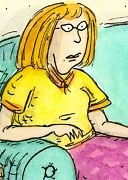- Shopping Bag ( 0 items )
-
All (26) from $12.43
-
New (18) from $16.38
-
Used (8) from $12.43




Overview
#1 New York Times Bestseller
2014 NATIONAL BOOK AWARD LONGLIST FOR NONFICTION
In her first memoir, Roz Chast brings her signature wit to the topic of aging parents. Spanning the last several years of their lives and told through four-color cartoons, family photos, and documents, and a narrative as rife with laughs as it is with tears, Chast’s memoir is both comfort and comic relief for anyone experiencing the ...